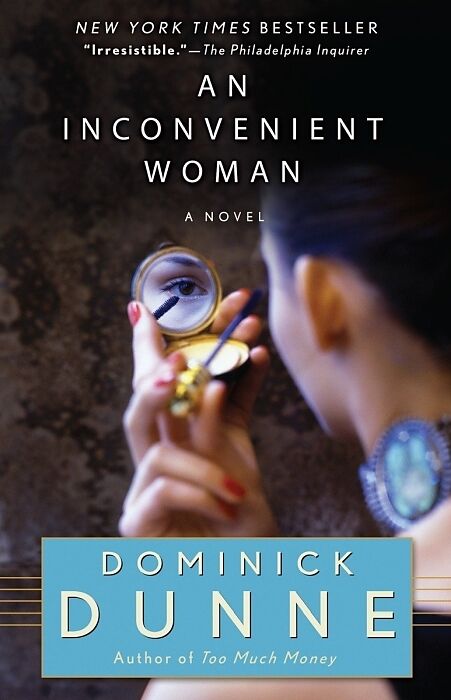

An Inconvenient Woman
Beschreibung
Informationen zum Autor Dominick Dunne Klappentext Jules Mendelson is wealthy. Astronomically so. He and his wife lead the kind of charity-giving, art-filled, high-society life for which each has been carefully groomed. Until Jules falls in love with Flo March...Format auswählen
- Poche format BCHF 21.10
Wird oft zusammen gekauft
Andere Kunden kauften auch
Beschreibung
Informationen zum Autor Dominick Dunne Klappentext Jules Mendelson is wealthy. Astronomically so. He and his wife lead the kind of charity-giving, art-filled, high-society life for which each has been carefully groomed. Until Jules falls in love with Flo March, a beautiful actress/waitress. What Flo discovers about the superrich is not a pretty sight. And in the end, she wants no more than what she was promised. But when Flo begins to share the true story of her life among the Mendelsons, not everyone is in a listening mood. And some cold shoulders have very sharp edges. . . . Zusammenfassung NEW YORK TIMES BESTSELLER • Good unclean fun . . . [a] convoluted, scandal-greased, exposed-backsides-of-the-rich-and-famous story . . . told in a confiding, breathless undertone. Entertainment Weekly Jules Mendelson is wealthy. Astronomically so. He and his wife lead the kind of charity-giving, art-filled, high-society life for which each has been carefully groomed. Until Jules falls in love with Flo March, a beautiful actress/waitress. What Flo discovers about the superrich is not a pretty sight. And in the end, she wants no more than what she was promised. But when Flo begins to share the true story of her life among the Mendelsons, not everyone is in a listening mood. And some cold shoulders have very sharp edges. . . .
Autorentext
Dominick Dunne
Klappentext
Jules Mendelson is wealthy. Astronomically so. He and his wife lead the kind of charity-giving, art-filled, high-society life for which each has been carefully groomed. Until Jules falls in love with Flo March, a beautiful actress/waitress. What Flo discovers about the superrich is not a pretty sight. And in the end, she wants no more than what she was promised. But when Flo begins to share the true story of her life among the Mendelsons, not everyone is in a listening mood. And some cold shoulders have very sharp edges. . . .
Zusammenfassung
NEW YORK TIMES BESTSELLER • “Good unclean fun . . . [a] convoluted, scandal-greased, exposed-backsides-of-the-rich-and-famous story . . . told in a confiding, breathless undertone.”—Entertainment Weekly
Jules Mendelson is wealthy. Astronomically so. He and his wife lead the kind of charity-giving, art-filled, high-society life for which each has been carefully groomed. Until Jules falls in love with Flo March, a beautiful actress/waitress. What Flo discovers about the superrich is not a pretty sight. And in the end, she wants no more than what she was promised. But when Flo begins to share the true story of her life among the Mendelsons, not everyone is in a listening mood. And some cold shoulders have very sharp edges. . . .
Leseprobe
1
 
Later he was vilified and disgraced; Archbishop Cooning denounced him from the pulpit of Saint Vibiana’s as a corruptor, and the archbishop’s words spread throughout the land. But before the disgrace and the vilification Jules Mendelson was, seemingly at least, on top of the world: awesome in appearance, brilliantly married, and revered in the manner that the very rich are revered in America.
 
Clouds, the Mendelson estate, which looks down on Los Angeles from its lofty mountaintop, remains unlived in but cared for, although the massive iron gates that once fronted a ducal residence in Wiltshire have become dislocated, their hinges pried loose by vandals. The caretaker on duty has backed the gates with plywood boards to keep the curious from staring in; but, even if they could stare in, they would see nothing of the house and gardens, for a few hundred feet up the drive there is a sharp turn to the right. Pauline Mendelson’s greenhouse, where she grew her orchids, has fallen into disrepair, but the kennels are kept up still, and a pack of police dogs patrols the grounds at night, as always.
 
There was a time when people said that the views from Clouds were the prettiest views in the city. Pauline Mendelson, mindful of this, had created one room to take best advantage of the sunrise over the downtown skyline, where she and Jules were meant to have breakfast together, but never did, except once; and another room for watching the sunset over the ocean, where, on most evenings, she and Jules did indeed meet to drink a glass of wine together and discuss the events of the day before dressing for dinner.
 
Probably no one ever conducted herself so well in a scandal as Pauline Mendelson. Everyone agrees on that. She held her head high and invited neither pity nor scorn. The city, or that part of the city that figured in the lives of these people, was beside itself with excitement. Nothing so thrilling had happened in years, except among the movie people, and no one they knew saw the movie people. Within a year of the events that riveted the city for so many months, Pauline became Lady St. Vincent and moved to England. She not only married quickly but also, being by birth one of the McAdoo sisters, the marrying McAdoos, as the papers often called them, married extremely well, even under the terrible circumstances. People say that all traces of her life as Mrs. Jules Mendelson have been totally obliterated, and in her new life she is not at home to people who knew her in Los Angeles, not even Rose Cliveden, and, God knows, if anyone was a good friend to Pauline Mendelson, it was Rose Cliveden.
 
“There were splendid times at Clouds for over twenty years. You had only to look at the signatures in the guest books when they came up for auction at Boothby’s, along with the furniture, the personal effects, and, of course, the extraordinary art collection, to get an idea of Pauline Mendelson’s voracious appetite for what she always called “interesting people.” As to the pictures, or the auction of the pictures, there is still rage in the art world today. The Metropolitan Museum in New York said it had been promised the collection. The County Museum in Los Angeles said the same, as did the Kimball in Fort Worth. And there were other museums, with lesser claims. But that was typical of Jules Mendelson. He liked being called on by heads of museums—being courted by them, as he put it—and hearing them praise his magnificent collection. He enjoyed walking them through the halls and rooms of his house, spelling out the provenance of each picture, as well as the stage in the life of the artist at the time the picture was painted. He liked letting each one think it was his museum to which the collection would go, in time; and surely he meant to leave it to one, because he often said, even in interviews, that he never wanted the collection to be broken up, and that he was leaving money for the construction of a wing, the Jules Mendelson Wing, to house it. But the fact remained that he did not make such a provision, although he had intended to, just as he had intended to make a provision for Flo March. Or poor Flo, as she came to be known. It was Pauline who decided to break up the collection and auction it off along with the furniture and personal effects, minus van Gogh’s White Roses and the bronze cast of Degas’s fourteen-year-old ballerina, with the original pink ribbon in her hair, which, some people say, are already installed in Kilmartin Abbey in Wiltshire.
 
Pauline Mendelson was one of those people totally at home in the inner circles of several cities, although she seemed to belong to none. Even after twenty-two years of living in Los Angeles, and becoming a prominent citizen there, Pauline always seemed like a visitor rather than a resident. Her parties at Clouds were famous, and rightly so. She left nothing to chance in the planning of her evenings. It was through one such party that young Philip Quennell was brought into the orbit of the renowned couple. Pauline liked to ask writers and artists to her house to m…
